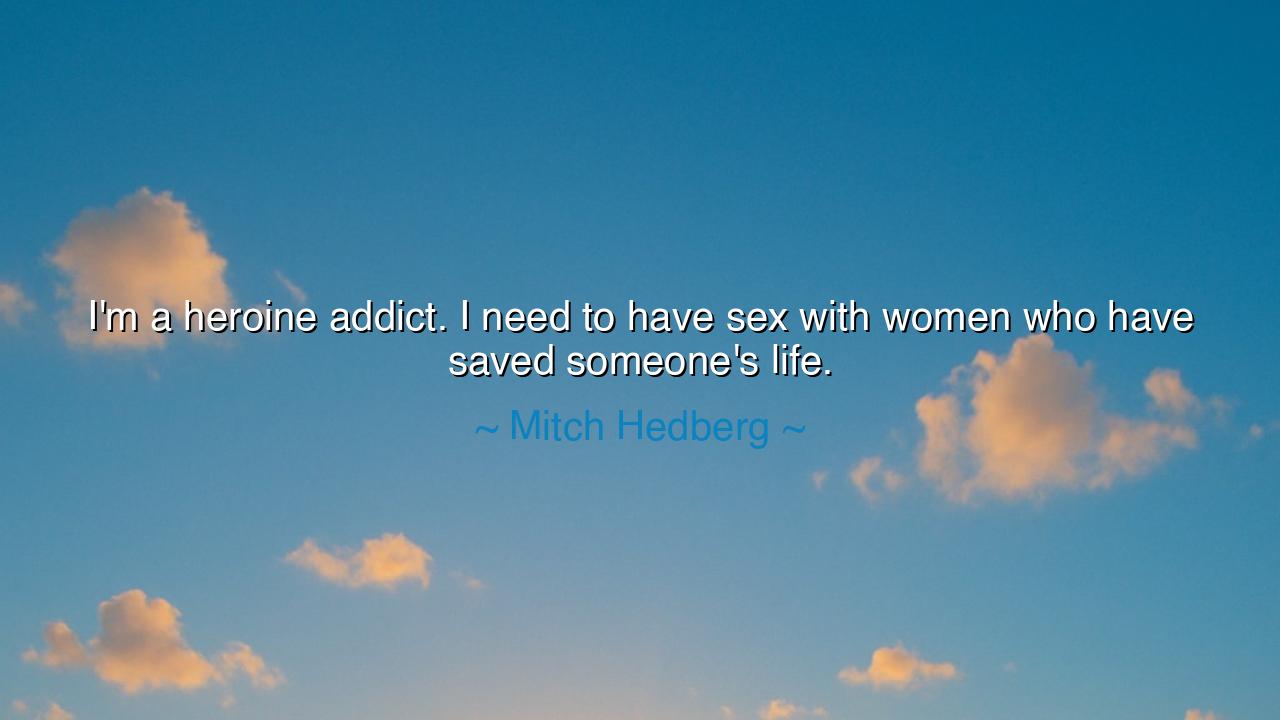
I'm a heroine addict. I need to have sex with women who have






Mitch Hedberg, the jester-philosopher of his age, once spoke in riddled jest: “I’m a heroine addict. I need to have sex with women who have saved someone’s life.” Though born of comedy, this utterance contains a double-edged truth, where laughter conceals wisdom. The play upon words—heroine as savior, addict as devotee—reveals not a confession of vice, but an admiration for those who embody courage. Beneath the veil of humor lies reverence: a longing to be close to greatness, to draw near to those who, in saving life, have touched eternity.
The ancients often used humor as a cloak for truth. The fools of courts spoke lightly yet carried daggers of wisdom in their words, protected by laughter from the wrath of kings. So too does Hedberg, with irony and wit, remind us that the truest desire of the heart is not flesh alone, but to be united with virtue, to be bound to those who have proven their spirit against death and despair. In this, he echoes the eternal teaching that admiration of greatness often disguises itself in strange garments.
History itself gives us figures who embody the heroine. Think of Florence Nightingale, who in the filth of war hospitals saved countless lives with devotion and skill. Or Harriet Tubman, who delivered slaves from bondage at the risk of her own existence. These women stand as heroines in the truest sense, and if Hedberg’s humor be stripped of jest, his yearning is clear: to be touched by the fire of such souls, to join with life-givers rather than life-takers.
In this light, the quote becomes more than comedy—it becomes an ode to admiration. The word addict speaks not to chains of weakness, but to a fervent longing, a hunger for greatness that ordinary life cannot satisfy. To be drawn to saviors is to seek out the radiant, those whose courage has lifted them above the ordinary. His jest, then, is a mirror for us all: are we not drawn, in our own way, to those who shine with heroic deeds?
Let this strange teaching be passed down: humor is often the cloak of truth, and laughter the vessel of wisdom. Hedberg’s words, though absurd on the surface, remind us that the human soul yearns for union with heroes, for closeness with those who embody life’s highest virtues. And though his tongue was playful, his heart revealed a secret all ages have known—that to touch a heroine is to touch immortality itself.






HNThi Huong Nguyen
This quote seems to combine the absurd with a reflection on deeper human struggles. Does Hedberg’s humor indicate a kind of resignation or awareness of the paradoxes in addiction and human relationships? Can humor be a tool for confronting uncomfortable truths about ourselves, or does it risk minimizing the seriousness of addiction and its impact on relationships?
NN25. Nhu Ngoc
Mitch Hedberg's words make me think about the darker side of addiction and the ways people often seek comfort in destructive patterns. But beyond the humor, how do we address the need for emotional connection and validation in a healthy way? Is it possible for someone struggling with addiction to form relationships that truly help them heal without falling into unhealthy cycles?
UNNhi Uyen Nguyen
The quote seems to be a sharp, sarcastic commentary on addiction, but it might also shed light on a common misunderstanding: the idea that certain relationships or experiences can 'save' someone. Is Hedberg poking fun at the unrealistic expectations we place on others to fix our internal struggles, or is he pointing out how addiction twists our desires?
HNHoangggg nguuuuu
While Mitch Hedberg’s quote is clearly meant to be humorous, it touches on a deeper theme of dependency and the need for validation. What is the connection between the concept of addiction and relationships where one partner feels they need to 'save' the other? Does this imply a desire for redemption or a misguided search for meaning in relationships?
M1fan gay tv media 100
Mitch Hedberg's quote uses humor to address serious issues like addiction and complex relationships. Is he commenting on the absurdity of human desires, or is this a dark, self-deprecating joke about how addiction can lead people to seek out unhealthy or contradictory behaviors? How do we balance humor with sensitivity when discussing topics like addiction and personal needs?